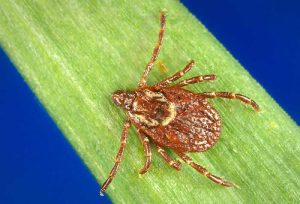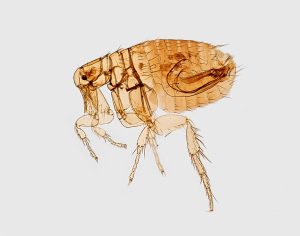Farm dog Brandi tends the rescued horses, calves and cats on our farm. The border collie needs flea and tick medication monthly due to heavy exposure to the pests.
Flea and tick medications are the hallmark prevention strategy of pet care programs. A new class of medication and vocal social media posters are stirring things up in pet health by calling some meds toxic. Is this good or bad? Well, it’s a combination of personal choice and professional recommendations that are putting America’s pet’s at risk. Check out our podcast on Voice America World Talk Radio as we discuss the perils of flea/tick medications and the hazards of NOT treating your pet.
So, let’s just say you don’t know a thing about whether flea and tick meds are toxic or not. In fact, starting from scratch is great starting point for our purpose here. But perhaps you know that fleas and ticks are responsible for some serious and sometimes fatal infections and co-infections for humans. Here’s a short and incomplete list of diseases spread by fleas and ticks:
Lyme, anaplasmosis, bartonella, erlichia, tuleremia, typhus, rocky mountain spotted fever and the bacteria that caused the Black Plague.
Remember, these diseases are considered COMMON in the United States in HUMANS.
Can I Get Sick If My Dog Has Fleas or Ticks?
In fact, vector borne illnesses make up 17% of the world’s ills, according to the World Health Organization. In this case, it’s bugs that spread pathogens. It’s a problem that’s been around for thousands of years.
Imagine the time of the deadly Justinian plague or hundreds of years later, the Black Plague. A fatal flea bite kills in just four days. Mothers lose not only their children but their lives, too. Today’s flea and tick medication, hundreds of years away from development, put a stop to these vector borne diseases in just hours. No one could even imagine one day that a simple readily available chemical could save babies, mothers, fathers, families from a horrible death. Millions of people died from vector borne illnesses. They would have been so grateful for a chance at life made possible through today’s medicine.
Galaxy Diagnostics offers important testing and diagnostics for patients with exposure to vector borne illnesses. Research shows 28% of veterinary workers are carriers of bartonella, the disease that causes cat scratch fever. Lifelong complications are possible. While clinic workers gain more exposure due to constant animal handling, it doesn’t mean people who live closer with pets than ever in history aren’t at risk, too.

Brown dog tick courtesy of CDC.

Can Flea & Tick Medications Make Dogs Sick?
While the world changes, so have the modern flea at tick medications. From old reliable products like Frontline or Revolution to the latest class of medications spawning plenty of Internet controversy. They’re called isoxazolines and these new meds are embroiled in concern. Here’s a look at one video featured on some social media pages showing a dog having a heartbreaking seizure. It’s owner blames an isoxazoline product like Bravecto, Credelio, Nexgard, Revolution Plus orSimparica.
The concerns stem from videos like this and hundreds of reports of neurologic symptoms in pets dosed with products in this class. The FDA issued a fact sheet for pet owners. In their statement, the federal agency informs pet owners that the experiences of other pets are concerning. The FDA also issues a demand that manufacturers label their products for side effects. However, the FDA statement is vague and warns of possible “adverse neurological events”. It falls short of banning isoxazolines or giving more specific information on the reason for the alert.
What Flea & Tick Medications are Killing Dogs?
According to Parisitpedia.com, isoxazolines are recently in production specifically for veterinary purposes. This class is entirely chemically produced, meaning if you’re looking at a natural foundation for your pet’s health product it’s absolutely nowhere in an isoxazoline. Here’s how it works to kill fleas and ticks:
“Isoxazolines with insecticidal and tickicidal efficacy are non-competitive GABA (gamma-aminobutyric acid) receptor antagonists, much more selective for GABA receptors in insects or ticks, than for those in mammals, including humans. They bind to chloride channels in nerve and muscle cells, which blocks the transmission of neuronal signals. Affected parasites are paralyzed and die.”
source: Parasitpedia.com
But this method of paralyzing parasite death is worrisome to pet owners given the symptoms seen in Internet videos and the current FDA alert. Is it a case of the power of social media greasing the wheels or is it the tip of the iceberg for toxic flea and tick medications?

Alarming Pet Health Alerts By the Food & Drug Administration
The case for the trending social media alert is made when looking at the apocalyptic alarm that transpires over grain free dog food. Does it cause dilated cardiomyopathy (DCIM)? A lot of people hear about limited numbers of cases on social media and the story blows up to affect the entire industry of pet food production and veterinary care. With thousands of reports of DCIM, the FDA alerts pet owners about the effect of grain free diets on dilated cardiomyopathy. Two years later, the FDA quietly reports their investigation is over. They didn’t find a link between the diets and the disease. In fact, very few reports of DCIM caused by grain free foods turn out to be reality. Will the same be the case for isoxazalines and dogs?
Am I a Bad Vet For Using Bravecto?
There is a lot of activity on our very small farm in Northern Illinois. Our family started Proud Ponies Equine Rescue and we take in rescued horses from the South Plains, These horses come in with lice, fleas, ticks and intestinal parasites. I have to protect my indoor/outdoor dogs and cats from a variety of pests.

Our evolving population of farm cats and rescued dogs is a major concern because all of them are indoor/outdoor animals who sleep in the most comfy locations: our beds. After removing ticks from our kids, we treat our formerly untreated pets with long-lasting isoxazoline products: specifically Bravecto.
The natural no chemical way provides peace of mind for pet health, but the modern way provides peace of mind for the humans in our family. While it was concerning to change our natural lifestyle, it had to be done immediately before someone in our extended human and fur family got sick with a tick or flea borne illness.
In the years we’ve given Bravecto all of our animals have been absolutely fine and I can say the same for thousands of my patients, fortunately. The FDA needs to provide studies and clarify the seriousness and reality of this problem. The current advisory from the FDA is vague and leaves owners and doctors filling in the blanks.
What Are The Safest Flea & Tick Medications?
A lot of people call flea and tick meds toxic. I would provide a warning on that. As a result of my holistic practice, I see many people with beliefs that are all over the map. In the area of flea and tick meds, a client came to me and instead of treating her dog with “toxic” medications, she buys into holistic advice online and treats the dog for months with diatomaceous earth. After a downhill spiral and serious lethargy, anemia and other concerns, the dog is gravely ill. This is a totally preventable death. By the time we use flea and tick medication it is simply too late. Her body gives up. A totally unnecessary death.
The most compelling reason to use the isoxazoline products at home for me is reducing the risk of infection to my humans. Not every family shares the same risk as we do on the farm. As a result, you may be fine with a tried and true older product or a holistic essential oil spray. Talk to your veterinarian about what’s right for you.

